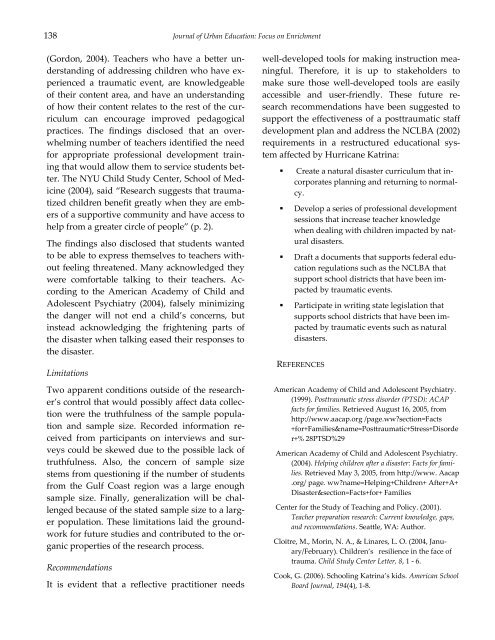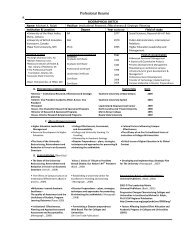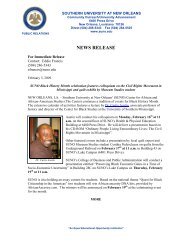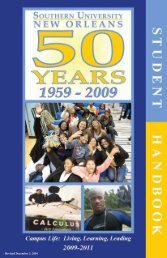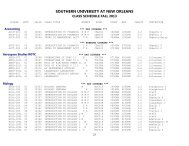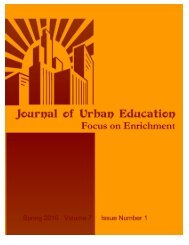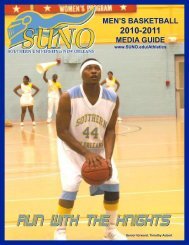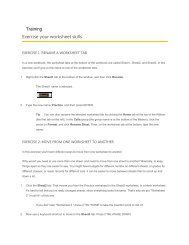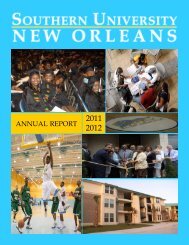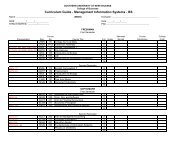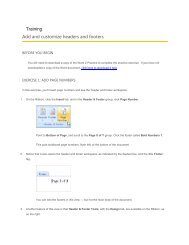Journal of - Southern University New Orleans
Journal of - Southern University New Orleans
Journal of - Southern University New Orleans
- No tags were found...
You also want an ePaper? Increase the reach of your titles
YUMPU automatically turns print PDFs into web optimized ePapers that Google loves.
138 <strong>Journal</strong> <strong>of</strong> Urban Education: Focus on Enrichment(Gordon, 2004). Teachers who have a better understanding<strong>of</strong> addressing children who have experienceda traumatic event, are knowledgeable<strong>of</strong> their content area, and have an understanding<strong>of</strong> how their content relates to the rest <strong>of</strong> the curriculumcan encourage improved pedagogicalpractices. The findings disclosed that an overwhelmingnumber <strong>of</strong> teachers identified the needfor appropriate pr<strong>of</strong>essional development trainingthat would allow them to service students better.The NYU Child Study Center, School <strong>of</strong> Medicine(2004), said ‚Research suggests that traumatizedchildren benefit greatly when they are embers<strong>of</strong> a supportive community and have access tohelp from a greater circle <strong>of</strong> people‛ (p. 2).The findings also disclosed that students wantedto be able to express themselves to teachers withoutfeeling threatened. Many acknowledged theywere comfortable talking to their teachers. Accordingto the American Academy <strong>of</strong> Child andAdolescent Psychiatry (2004), falsely minimizingthe danger will not end a child’s concerns, butinstead acknowledging the frightening parts <strong>of</strong>the disaster when talking eased their responses tothe disaster.LimitationsTwo apparent conditions outside <strong>of</strong> the researcher’scontrol that would possibly affect data collectionwere the truthfulness <strong>of</strong> the sample populationand sample size. Recorded information receivedfrom participants on interviews and surveyscould be skewed due to the possible lack <strong>of</strong>truthfulness. Also, the concern <strong>of</strong> sample sizestems from questioning if the number <strong>of</strong> studentsfrom the Gulf Coast region was a large enoughsample size. Finally, generalization will be challengedbecause <strong>of</strong> the stated sample size to a largerpopulation. These limitations laid the groundworkfor future studies and contributed to the organicproperties <strong>of</strong> the research process.RecommendationsIt is evident that a reflective practitioner needswell-developed tools for making instruction meaningful.Therefore, it is up to stakeholders tomake sure those well-developed tools are easilyaccessible and user-friendly. These future researchrecommendations have been suggested tosupport the effectiveness <strong>of</strong> a posttraumatic staffdevelopment plan and address the NCLBA (2002)requirements in a restructured educational systemaffected by Hurricane Katrina:• Create a natural disaster curriculum that incorporatesplanning and returning to normalcy.• Develop a series <strong>of</strong> pr<strong>of</strong>essional developmentsessions that increase teacher knowledgewhen dealing with children impacted by naturaldisasters.• Draft a documents that supports federal educationregulations such as the NCLBA thatsupport school districts that have been impactedby traumatic events.• Participate in writing state legislation thatsupports school districts that have been impactedby traumatic events such as naturaldisasters.REFERENCESAmerican Academy <strong>of</strong> Child and Adolescent Psychiatry.(1999). Posttraumatic stress disorder (PTSD): ACAPfacts for families. Retrieved August 16, 2005, fromhttp://www.aacap.org /page.ww?section=Facts+for+Families&name=Posttraumatic+Stress+Disorder+% 28PTSD%29American Academy <strong>of</strong> Child and Adolescent Psychiatry.(2004). Helping children after a disaster: Facts for families.Retrieved May 3, 2005, from http://www. Aacap.org/ page. ww?name=Helping+Children+ After+A+Disaster§ion=Facts+for+ FamiliesCenter for the Study <strong>of</strong> Teaching and Policy. (2001).Teacher preparation research: Current knowledge, gaps,and recommendations. Seattle, WA: Author.Cloitre, M., Morin, N. A., & Linares, L. O. (2004, January/February).Children’s resilience in the face <strong>of</strong>trauma. Child Study Center Letter, 8, 1 - 6.Cook, G. (2006). Schooling Katrina’s kids. American SchoolBoard <strong>Journal</strong>, 194(4), 1-8.


